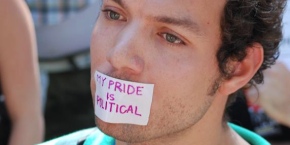Pride Toronto’s (PT) announcement, on June 23, that it would get out of the censorship business altogether is a great victory for Toronto’s gay and lesbian communities. But as myriad ad hoc groups formed to organize protests against PT’s censorship of the term “Israeli apartheid” these past two weeks, the move seemed to come somewhat out of the blue.

Xtra has learned the impasse was broken after a meeting at Liberal MPP Glen Murray’s office on the afternoon of June 18. Among those in attendance were Murray, Metropolitan Community Church of Toronto pastor Brent Hawkes, 519 Church Street Community Centre executive director Maura Lawless, Egale Canada executive director and Pride Toronto board member Helen Kennedy, and PT human rights committee member and Coalition for Free Speech member Doug Kerr. Lawyer Douglas Elliott, who also signed onto the resolution and press release repealing the ban, was not present at that meeting but became involved subsequently.
“I got called in, tried to give Helen and Tracey some names [of those who could help],” Murray told Xtra last night. “My job is to protect PT’s funding, to keep government out of dictating the content of cultural, social and political events and to try to bring the community together. That’s what I’ve been up to. We were very lucky that those people stepped forward.”
So, what was the mechanism by which a small meeting of community diplomats who have been largely silent on this almost year-old issue led to PT’s resolution to rescind the ban?
“After the meeting, I called [PT executive director] Tracey Sandilands and met with her on the Monday of this week,” says Hawkes. “I spent a lot of time talking to her and explained to her both motions. After meeting with Tracey, I asked for a meeting with the folks on the Pride board who voted in favour of the ban, or who weren’t there and so weren’t part of the initial vote. Douglas, Maura and I went to that meeting. Tracey called those five board members and said we had a proposal. The Pride board met the next evening…. that group voted unanimously to approve the two motions.”
It seems so easy. Sandilands has so far declined Xtra‘s request for comment but it seems implausible that PT would have chosen to rescind its choice to act as censor without the direct activist pressure applied against it these past weeks. Questions about whether or not PT intended to sanction arrest or ejection from the parade route of those it determined in violation of the city’s anti-discrimination policy were hanging in air. Much of PT’s consitituency was in open revolt. Repealing the ban and insisting the city take responsibility for interpreting its own anti-discrimination policy seemed the only reasonable and viable option.
“It’s so weird to be in the backdrop of the G20 where all this protest and violence and security and police state is unfolding,” says former 2010 honoured dyke Jane Farrow. “The opportunity for us to exhibit free speech and peaceful demonstration is so important. Maybe somebody did the optics and realized we could actually do this differently. The history and reputation of Toronto as being a place for that kind of protest, dissent and free speech could be upheld. Also, you think you had trouble raising money after a little skirmish with this group, try having some violence happen in your Pride parade and see how that affects the bottom line in the next year. Maybe someone did that. It was just escalating; it wasn’t going away.”
 Rescinding the ban “came about because I asked people to come together to try to find a solution,” says Kerr, who adds that he did not attend the meeting at Murray’s office as a representative of the Coalition but rather in his capacity as a PT human rights committee member. “The work that the coalition and QuAIA has been doing to raise the awareness of these issues and the public community meeting, the 23 award winners who gave back their awards, the activism, all of this community engagement all over the community is part of how this happened. You can’t look to what Brent and Doug and Maura have done in isolation.”
Rescinding the ban “came about because I asked people to come together to try to find a solution,” says Kerr, who adds that he did not attend the meeting at Murray’s office as a representative of the Coalition but rather in his capacity as a PT human rights committee member. “The work that the coalition and QuAIA has been doing to raise the awareness of these issues and the public community meeting, the 23 award winners who gave back their awards, the activism, all of this community engagement all over the community is part of how this happened. You can’t look to what Brent and Doug and Maura have done in isolation.”
Still Murray and Hawkes encourage everyone to congratulate and support PT staff and directors for ultimately making the right decision. And in the end, PT did do the right thing. Yesterday’s announcement is a huge leap toward a successful Pride celebration for 2010.
“There are a lot of young people on the PT board without a lot political experience,” says Murray. “I dare say that in the school of sharp learning curves these folks got a crash course in community politics 101. I think many people may not have given them a passing grade a couple of weeks ago; I think a lot of people will now show them some deserved respect.”
 Why you can trust Xtra
Why you can trust Xtra


